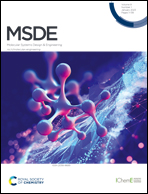Design of LCST-type phase separation of poly(4-hydroxystyrene)†
Abstract
Commercially available poly(4-hydroxystyrene) was introduced as a new LCST (lower critical solution temperature)-type thermo-responsive polymer at ambient temperature. The LCST-type phase separation was designed by control of the solvation and desolvation of the polymer chain in the mixtures of hydrogen-bonding solvents for solvation and non-polar solvents as a non-solvent for desolvation. As examples, the mixture of THF/1,2-dichloroethane (DCE) at a 3/7 ratio provided the LCST-type phase separation with the cloud point at 45 °C, monitored by the transmittance change. At the cloud point, the THF molecules were not able to solvate the polymer chain due to the thermal cleavage of the hydrogen bonds between the polymer and the THF molecules, which induced aggregation of the polymer chains. In conclusion, LCST-type thermo-responsive polymers can be easily realized by designing the hydrogen bonds between the polymer and the solvent molecules through controlling the solvation and desolvation of the polymer chain. This should provide another important molecular design for LCST-type thermo-responsive polymers in organic media.



 Please wait while we load your content...
Please wait while we load your content...